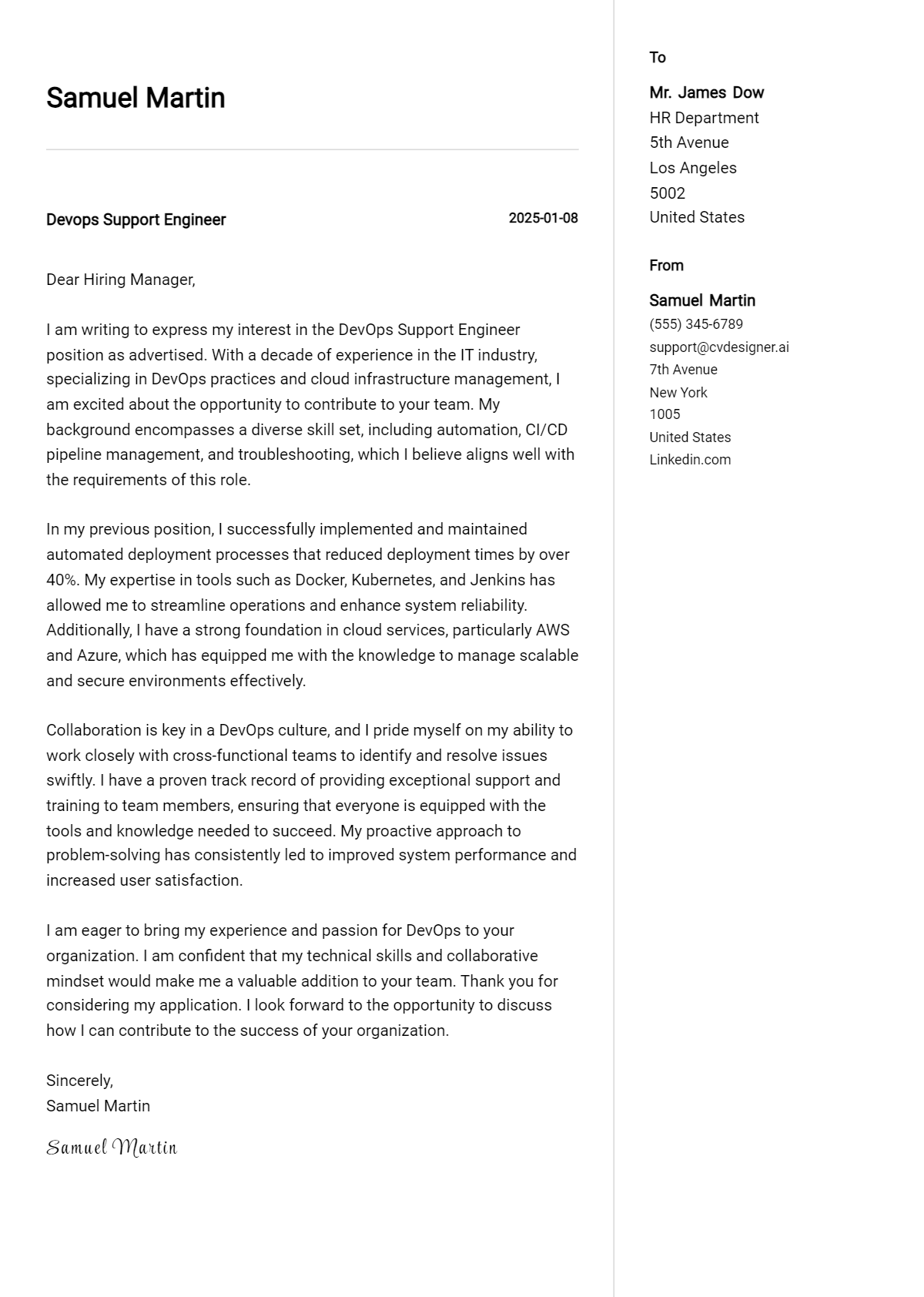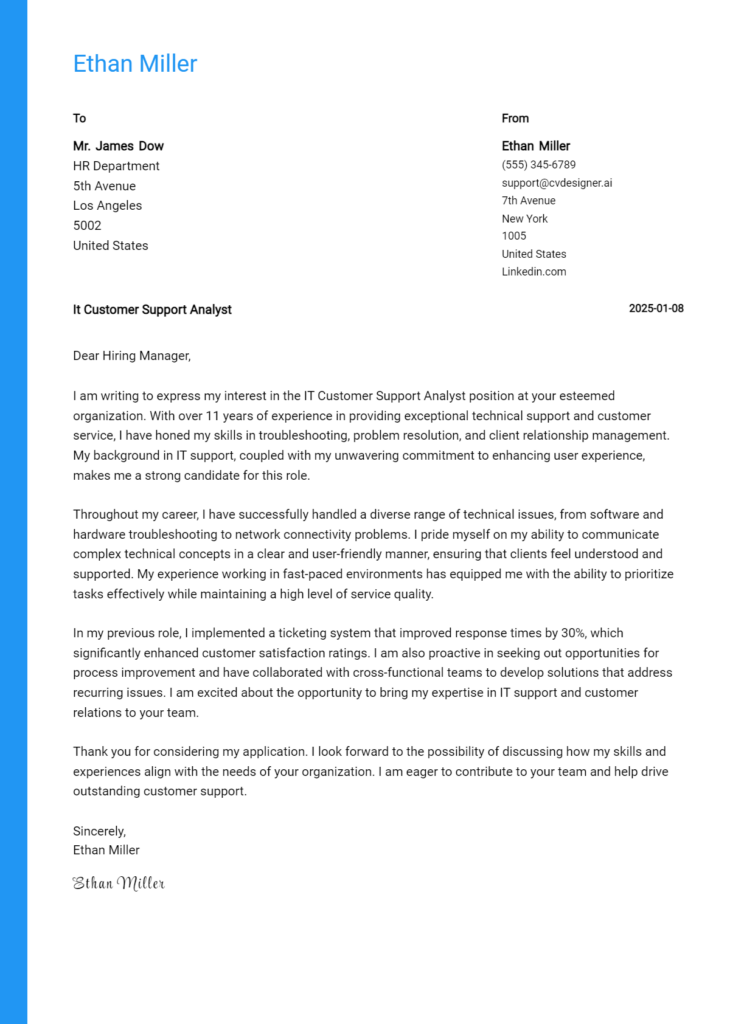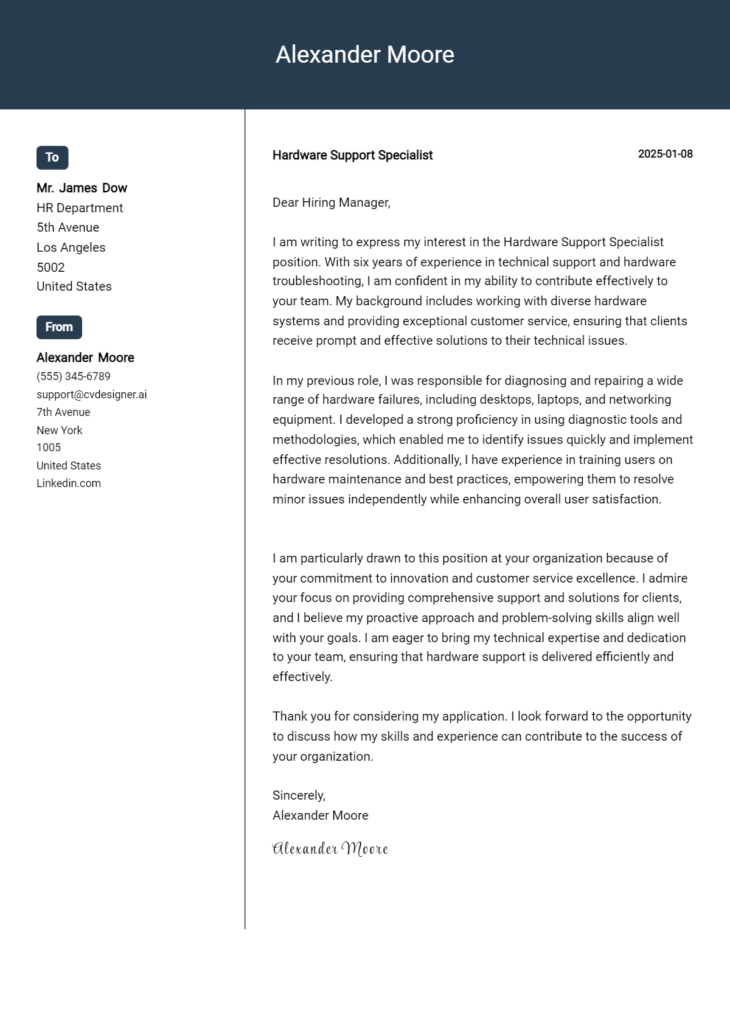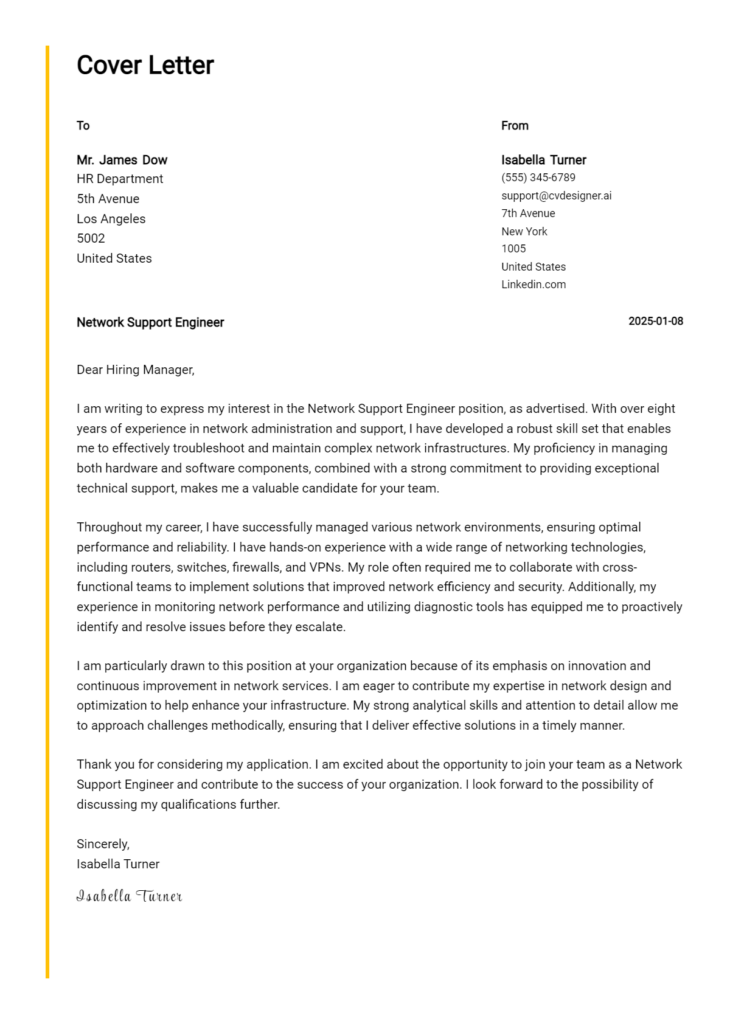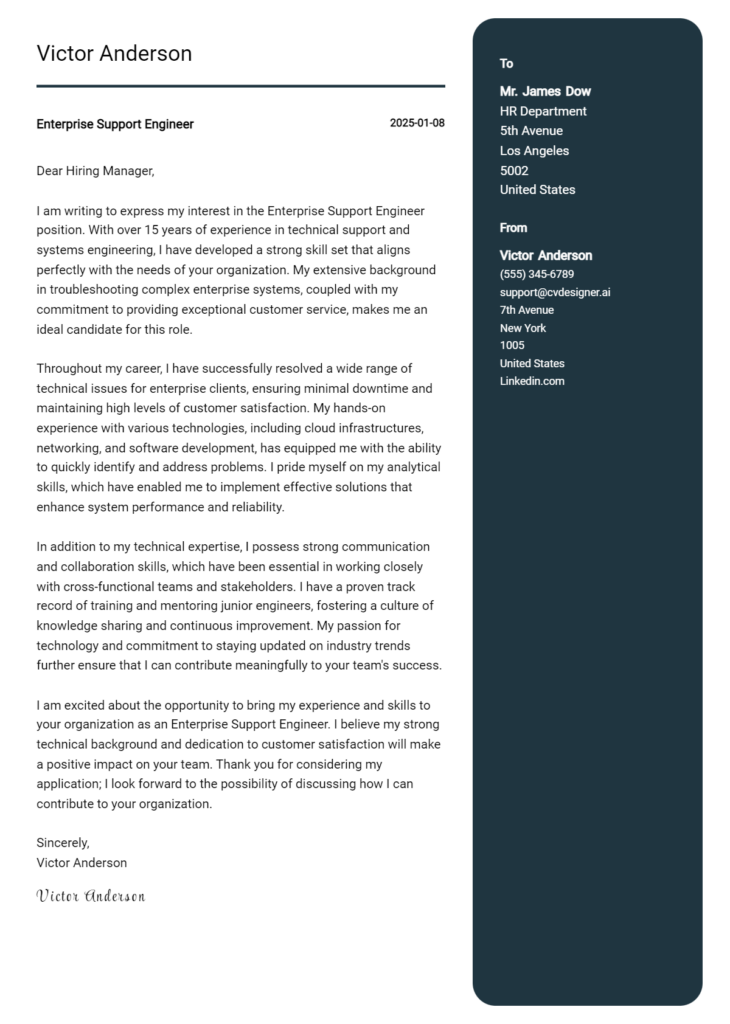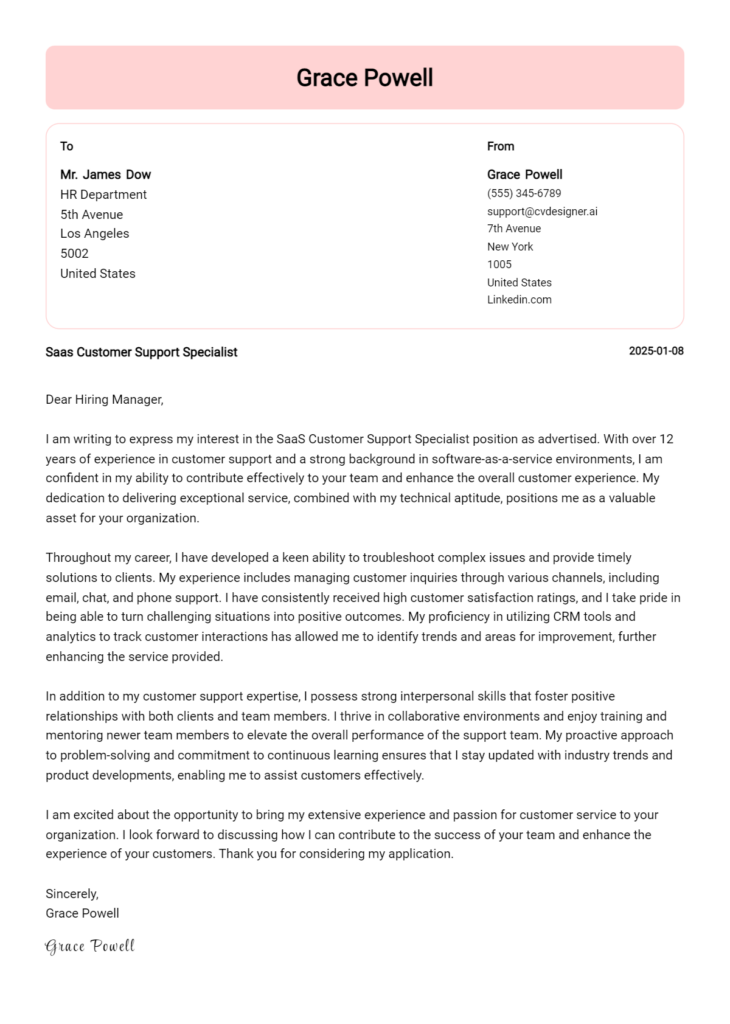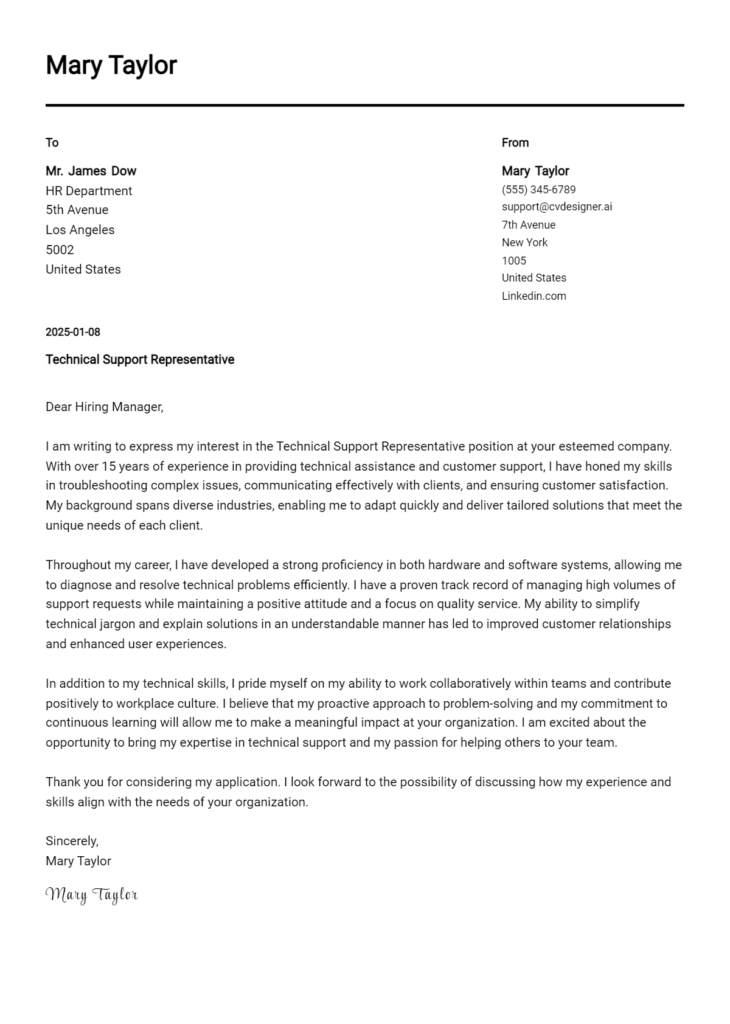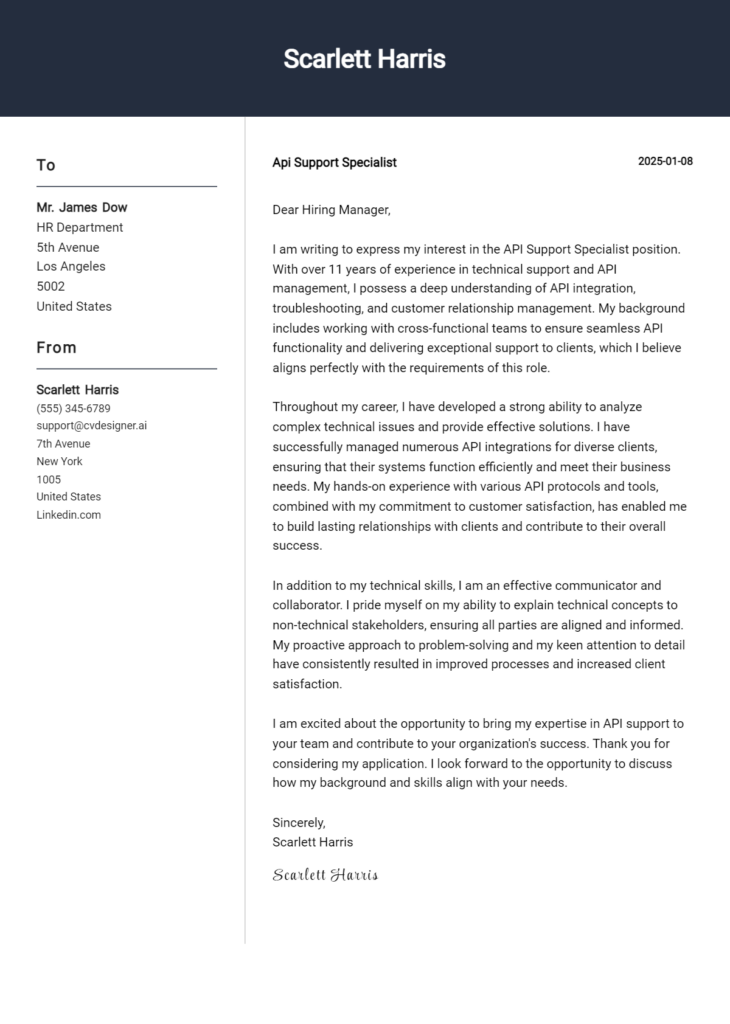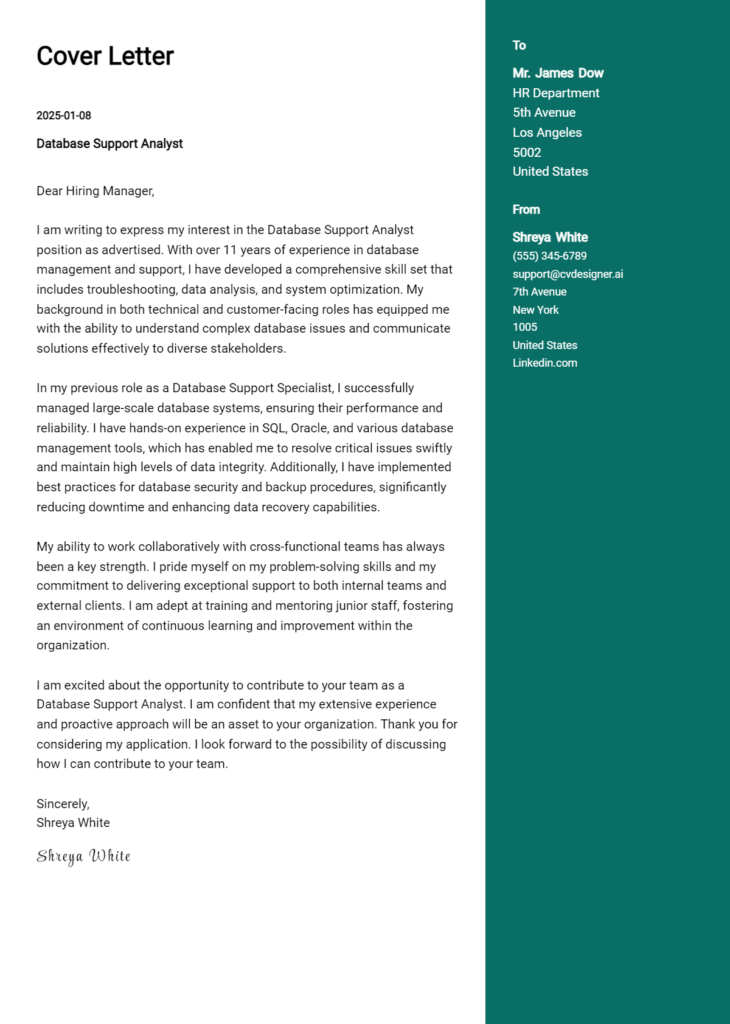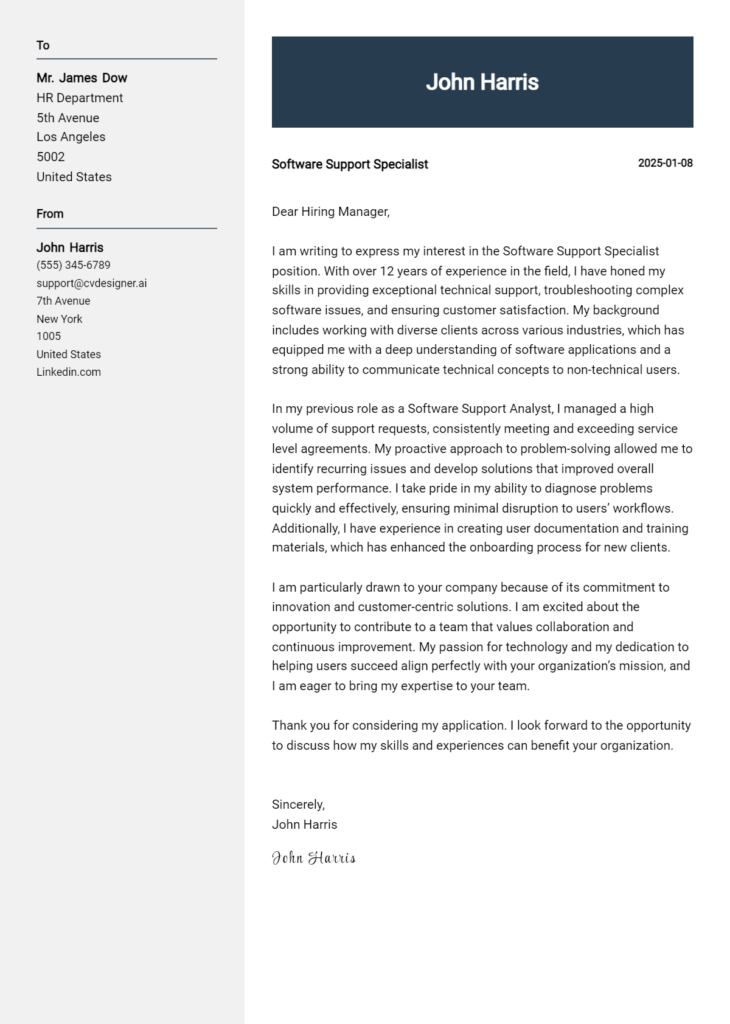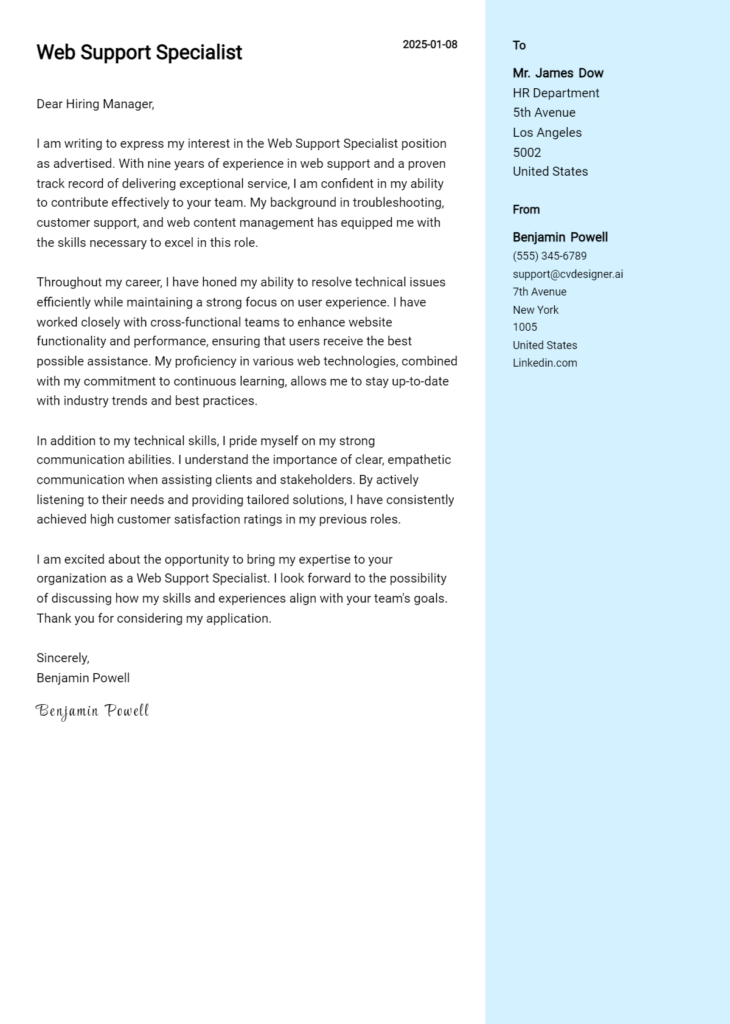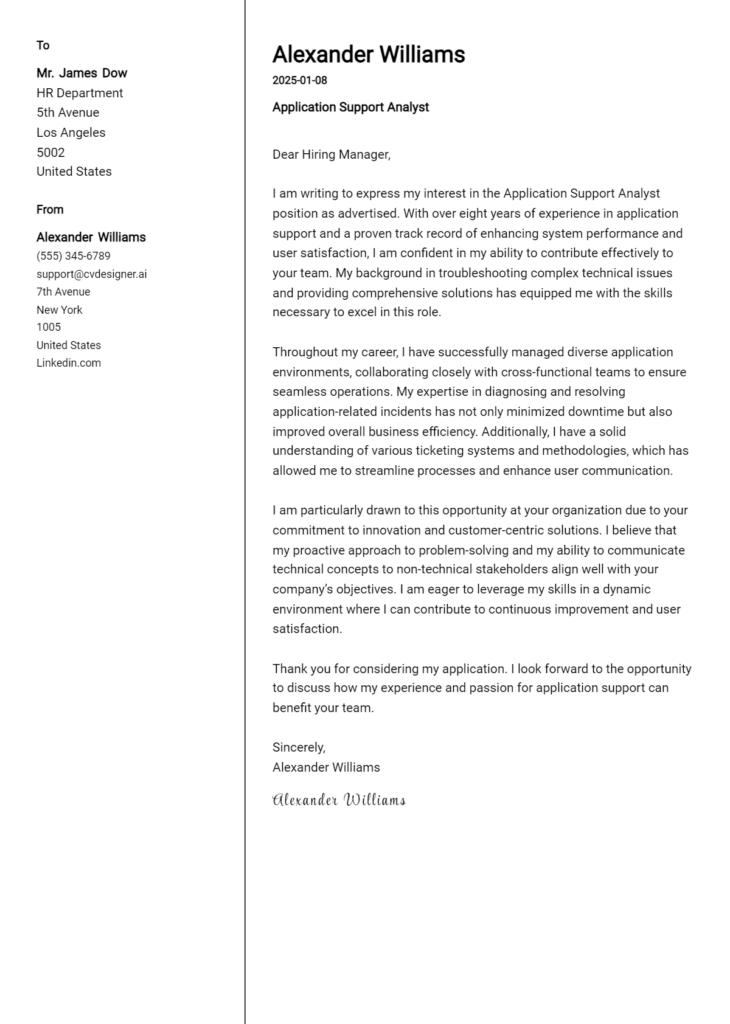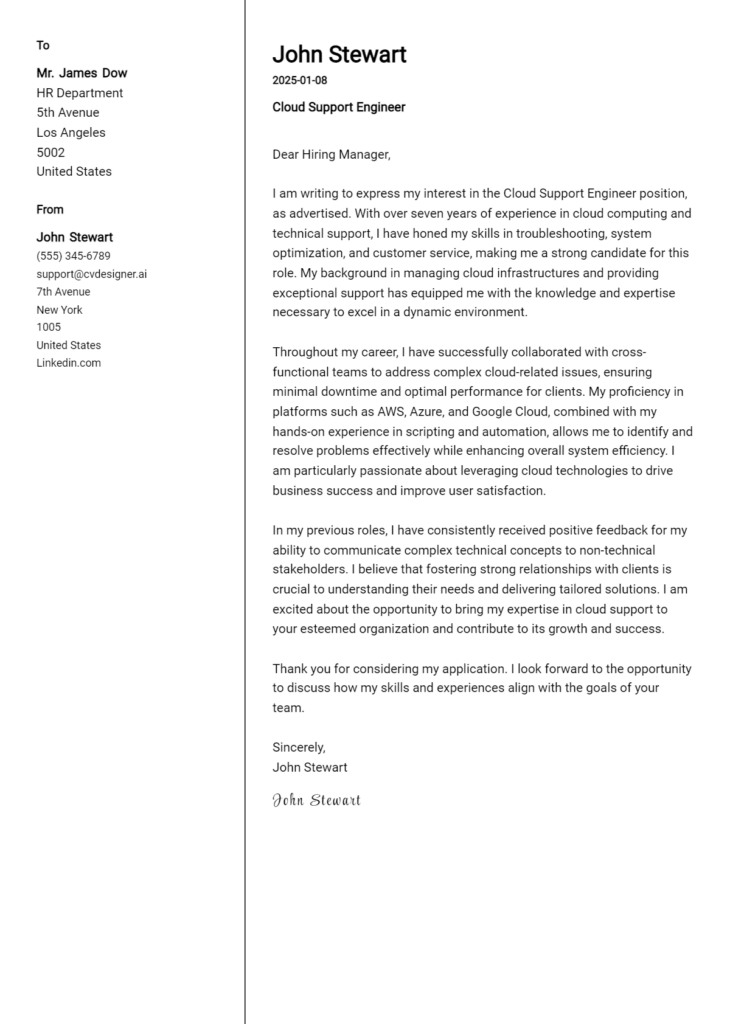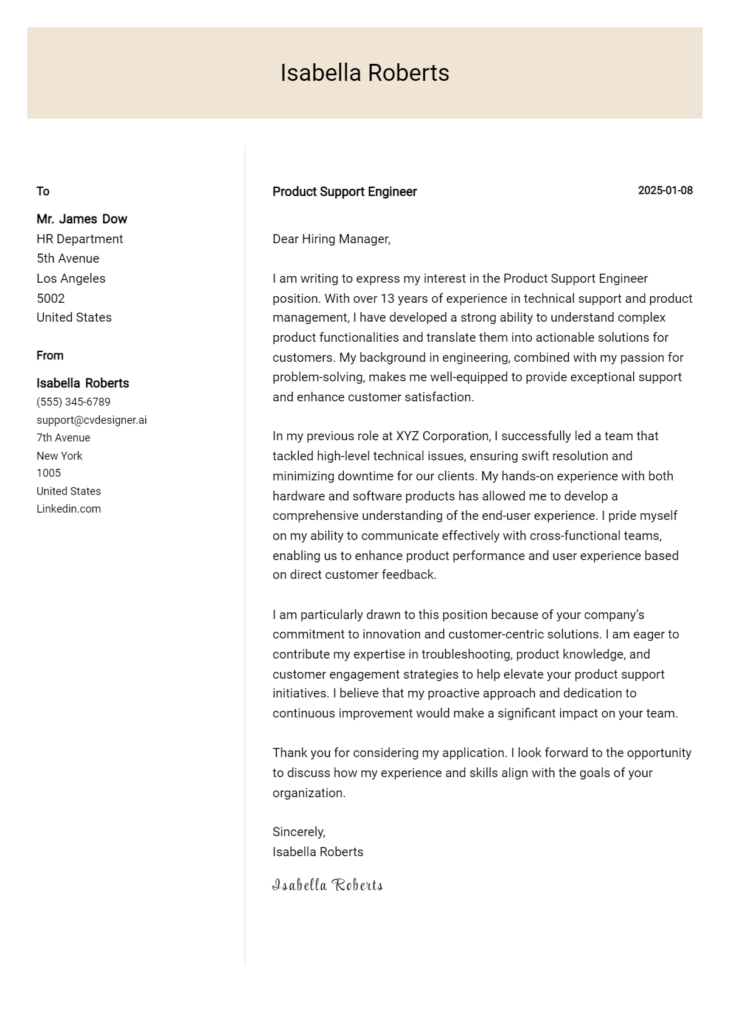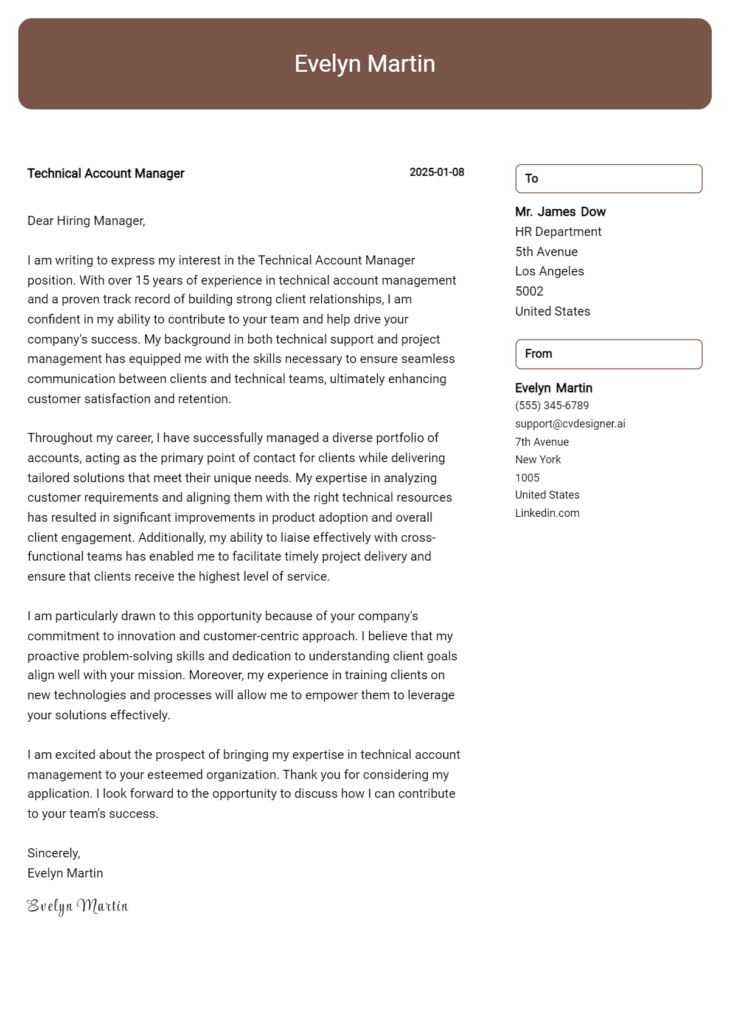Devops Support Engineer Cover Letter Examples
Explore additional Devops Support Engineer cover letter samples and guides and see what works for your level of experience or role.
How to Format a DevOps Support Engineer Cover Letter?
Crafting an effective cover letter is essential for a DevOps Support Engineer, as it not only highlights your technical skills but also showcases your ability to communicate effectively and collaborate within teams. Proper formatting is crucial in making a strong first impression, reflecting your organizational skills and attention to detail—qualities that are vital in the dynamic field of DevOps. A well-structured cover letter can capture the hiring manager's attention and clearly demonstrate your fit for the role.
In this guide, we'll outline how to format your cover letter to maximize its impact, focusing on the specific needs of a DevOps Support Engineer. We'll cover the essential components of a professional cover letter, including:
- Cover Letter Header
- Cover Letter Greeting
- Cover Letter Introduction
- Cover Letter Body
- Cover Letter Closing
Each section is instrumental in emphasizing your qualifications and professionalism. Let’s break down each part and explore how to make your DevOps Support Engineer cover letter stand out.
Importance of the Cover Letter Header for a DevOps Support Engineer
The cover letter header is a crucial element in establishing a professional first impression for a DevOps Support Engineer. It serves to present your contact information, the date, and the recipient's details in a clear and organized manner. This header not only provides essential information for the hiring manager but also sets the tone for the rest of the letter. Clarity and professionalism are paramount, as they reflect your attention to detail and organizational skills—key attributes for a role in DevOps.
A strong header will ensure that your application is easily identifiable and that all necessary contact information is readily available, while a weak header may lead to confusion or a lack of professionalism.
Strong Example
John Doe 123 Main Street City, State, ZIP john.doe@email.com (123) 456-7890 October 1, 2023 Hiring Manager XYZ Tech Solutions 456 Corporate Blvd City, State, ZIP
Weak Example
john.doe@email.com 10/01/23 To Whom It May Concern,
The Importance of the Cover Letter Greeting for a DevOps Support Engineer
The greeting of your cover letter is a crucial element that sets the tone for the rest of your application. It serves as the first impression you make on the hiring manager and reflects your professionalism and attention to detail. By addressing the hiring manager directly, you demonstrate a level of personalization that can distinguish you from other candidates. Avoiding generic greetings, such as "To Whom It May Concern," is essential; instead, take the time to research and find out the name of the person who will read your application. This small effort can show your genuine interest in the position and the company, making your cover letter more memorable.
Strong Greeting Example
Dear [Hiring Manager's Name],
Weak Greeting Example
To Whom It May Concern,
The Importance of a Well-Crafted Cover Letter Introduction for a DevOps Support Engineer
A well-crafted cover letter introduction is crucial for a DevOps Support Engineer, as it sets the tone for the entire application and provides the first impression to the hiring manager. This opening paragraph should not only capture attention but also express genuine enthusiasm for the role and the company. Moreover, it should briefly highlight key skills or achievements that align with the job requirements, demonstrating the candidate's suitability for the position. A strong introduction can differentiate a candidate in a competitive job market, while a weak one may lead to missed opportunities. Below are examples that illustrate the difference between an effective and ineffective introduction.
Strong Example
Dear [Hiring Manager's Name], I am excited to apply for the DevOps Support Engineer position at [Company Name], as I believe my extensive experience in cloud infrastructure and automation tools aligns perfectly with your team’s needs. With over five years of hands-on experience managing CI/CD pipelines and a proven track record of reducing deployment times by 30%, I am eager to bring my expertise to [Company Name] and contribute to your innovative projects. My passion for optimizing workflows and enhancing operational efficiency drives my commitment to delivering exceptional support and solutions in a fast-paced environment.
Weak Example
To Whom It May Concern, I am writing to apply for the DevOps Support Engineer job. I have some experience in IT and know a bit about DevOps. I think I could do this job. I've worked in a few companies, and I hope you can consider my application.
Purpose of the Cover Letter Body for a DevOps Support Engineer
The body of a cover letter for a DevOps Support Engineer serves as a critical platform for candidates to effectively communicate their technical capabilities, relevant experiences, and overall value to prospective employers. This section should emphasize specific projects or accomplishments that demonstrate the candidate's expertise in implementing CI/CD pipelines, managing cloud infrastructure, and optimizing system performance. By highlighting measurable outcomes, such as reduced deployment times or improved system uptime, candidates can present a compelling narrative that aligns their skills with the needs of the organization.
Strong Example
In my previous role at XYZ Corp, I played a pivotal role in transitioning our development team to a fully automated CI/CD pipeline using Jenkins and Docker. This initiative reduced our deployment time by 40% and significantly minimized production errors. Additionally, I led a project to migrate our infrastructure to AWS, which improved our system availability to 99.9% and decreased our operational costs by 30%. My hands-on experience with monitoring tools like Prometheus and Grafana further enabled me to proactively address potential issues before they impacted our users, showcasing my commitment to maintaining optimal system performance.
Weak Example
I have worked in IT for several years and have some experience with cloud technologies. I think I would be a good fit for the DevOps role because I can troubleshoot issues when they arise. I have also used tools like Jenkins and Docker, but I don't have specific accomplishments to share. I am eager to learn more about DevOps practices and hope to contribute to your team.
Importance of the Cover Letter Closing for a DevOps Support Engineer
The closing paragraph of a cover letter is crucial as it serves to summarize your qualifications, reiterate your enthusiasm for the role, and encourage the hiring manager to take the next steps, such as reviewing your resume or scheduling an interview. A strong closing leaves a lasting impression and reinforces your suitability for the position, while a weak closing can diminish the impact of your application.
Strong Example
In conclusion, I am excited about the opportunity to contribute my expertise in DevOps practices and my passion for continuous improvement to your team. With my proven track record in automating deployment processes and resolving system issues, I am confident that I can add significant value to your organization. I look forward to the possibility of discussing my application further and am eager to share how my skills can help achieve your goals. Thank you for considering my application; I hope to speak with you soon.
Weak Example
Thanks for reading my letter. I think I might be a good fit for the DevOps Support Engineer role. Please look at my resume when you have time. I hope to hear back from you.
Crafting an effective cover letter for a DevOps Support Engineer position is crucial in making a strong first impression on potential employers. Your cover letter should not only highlight your technical skills but also demonstrate your problem-solving abilities, understanding of the Software Development Life Cycle (SDLC), teamwork, and your passion for continuous learning. The following tips will guide you in creating a compelling cover letter that stands out.
Tips for Writing a Cover Letter for a DevOps Support Engineer
Showcase Your Technical Skills
Be specific about the technologies and tools you are proficient in. Mention relevant programming languages, cloud platforms, CI/CD tools, and configuration management systems. This not only demonstrates your capabilities but also aligns your skills with the job requirements. Consider incorporating examples of how you've successfully utilized these technologies in previous roles.Emphasize Problem-Solving Abilities
DevOps Support Engineers often face unexpected challenges. Highlight your problem-solving skills by providing examples of specific issues you resolved in past positions. Describe the situation, the action you took, and the outcome. This structured approach will showcase your analytical thinking and resourcefulness.Demonstrate Knowledge of SDLC
Understanding the Software Development Life Cycle is key in a DevOps role. Briefly explain your familiarity with different phases of the SDLC and how you have contributed to each phase in previous jobs. This shows that you can effectively collaborate with development teams and streamline processes.Highlight Teamwork and Collaboration
DevOps is all about bridging gaps between development and operations teams. Share examples of how you’ve worked effectively in teams, whether it be through leading projects or contributing to group initiatives. Illustrating your ability to communicate and collaborate with diverse teams will make your application more appealing.Express Passion for Continuous Learning
The tech landscape is ever-evolving, and a DevOps Support Engineer must keep up with the latest trends and tools. Mention any relevant certifications, courses, or personal projects that reflect your commitment to continuous learning. This shows potential employers that you are proactive and dedicated to improving your skill set.
By following these tips and utilizing resources like cover letter templates and a cover letter builder, you can craft a standout cover letter that effectively showcases your qualifications for a DevOps Support Engineer role.
Common Mistakes to Avoid in a DevOps Support Engineer Cover Letter
Avoiding common mistakes in your cover letter is crucial for standing out as a candidate for a DevOps Support Engineer position. A well-crafted cover letter can showcase your technical skills and passion for the role. Here are some common pitfalls to watch out for:
Generic Content: Failing to customize your cover letter can make you seem uninterested. Always tailor your letter to the specific job and company.
Neglecting Technical Skills: Omitting essential technical skills relevant to DevOps can be detrimental. Highlight your expertise in tools like Docker, Jenkins, and AWS.
Lack of Specific Examples: Vague statements about your experience can weaken your application. Use specific examples to demonstrate your contributions to previous projects.
Ignoring Formatting Guidelines: A poorly formatted cover letter can be off-putting. Follow professional cover letter format to ensure clarity and readability.
Overly Long Letters: Being overly verbose can dilute your message. Keep your cover letter concise, ideally one page in length.
Failing to Proofread: Typos and grammatical errors can undermine your professionalism. Always proofread your letter or have someone else review it.
Not Including a Call to Action: Neglecting to express your desire for an interview can leave your letter feeling incomplete. Close with a strong call to action.
By steering clear of these mistakes and following best practices, including reviewing cover letter examples, you can create a compelling cover letter that captures the attention of hiring managers.
Cover Letter FAQs for DevOps Support Engineer
What should I include in my cover letter for a DevOps Support Engineer position?
Your cover letter should highlight your technical skills, experience with automation tools, and familiarity with cloud services. Start with a strong introduction that mentions the position you're applying for and where you found the job listing. In the body, discuss your previous roles, particularly focusing on your experience with CI/CD pipelines, container orchestration (like Kubernetes), and infrastructure as code (like Terraform). Include specific achievements or projects that demonstrate your problem-solving abilities and collaboration with development teams. Conclude with a call to action expressing your enthusiasm for the role and your desire to discuss your qualifications further.
How can I demonstrate my technical skills in my cover letter?
To effectively demonstrate your technical skills, use specific examples from your previous work experience. Mention the tools and technologies you are proficient in, such as Jenkins, Docker, or AWS, and explain how you've utilized them to improve processes or resolve issues. For instance, you could describe a time when you implemented a CI/CD pipeline that reduced deployment times by a certain percentage. Additionally, emphasize your understanding of monitoring and logging tools like Prometheus or Splunk, and how you’ve used them to enhance system reliability. Quantifiable results can make your claims more persuasive.
Should I tailor my cover letter for each job application?
Absolutely! Tailoring your cover letter for each application is crucial for standing out in a competitive job market. Research the company and the specific requirements of the DevOps Support Engineer role, and align your experiences with their needs. Use keywords from the job description to show that you understand what they are looking for. For instance, if they emphasize experience with cloud infrastructure, make sure to highlight your relevant experience in that area. Personalizing your cover letter not only shows your genuine interest in the position but also demonstrates your understanding of the company’s goals and challenges.
How long should my cover letter be?
Your cover letter should typically be one page long, consisting of three to four paragraphs. Aim for a length of around 250-400 words. This allows you to provide enough detail about your skills and experiences without overwhelming the reader. Start with a concise introduction, followed by a body that elaborates on your qualifications and relevant experiences. Keep paragraphs focused and avoid lengthy explanations. Conclude with a strong closing that reiterates your enthusiasm for the position and invites further discussion. Remember, clarity and brevity are key to maintaining the reader’s attention.
Build your Cover Letter in minutes
Use an AI-powered cover letter builder and have your letter done in 5 minutes. Just select your template and our software will guide you through the process.

